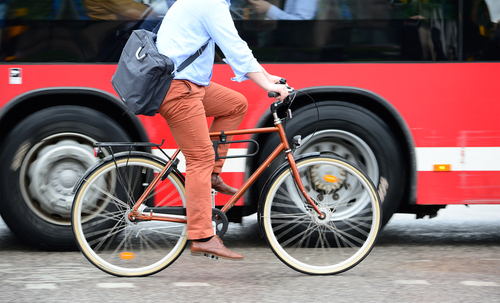
The Pittsburgh Downtown Partnership (PDP) announced earlier this month a $1 million grant award from the Henry L. Hillman Foundation to help develop the Downtown Pittsburgh Mobility Plan, which will seek to identify and prioritize opportunities to improve the city’s transportation infrastructure for residents and tourists.
The Mobility Plan will specifically focus on ways to improve pedestrian, transit, biking, vehicle, and delivery experience while prioritizing future projects that will continue evolving Downtown Pittsburgh as a vibrant and thriving economic, cultural, and transportation hub.
The PDP released a preliminary survey the week of Dec. 2 to hear from the public on what they find is most important in terms of navigating the city’s business and entertainment district. The survey will be available on the PDP website until Jan. 20.
“It’s about immediacy,” Chris Watts, PDP vice president of mobility, said, regarding the plan’s development. “It’s about the immediate ways that we can optimize Downtown Pittsburgh to provide better access for the people who live, work and travel there.”
The planning process began with an existing conditions analysis, which includes the PDP public survey, in the fall of 2019 and is expected to continue through summer 2020. Next steps include identifying guiding principles and goals, developing a street hierarchy map and freight/delivery analysis, creating a high impact project list, and then releasing the final plan.
PDP President and CEO Jeremy Waldrup said the Mobility Plan is the best way to address challenges, including safety, accessibility, transit, parking and congestion, in an area that is vital for the continued success of Pittsburgh as a place to do business, to make a home, and to visit.
And a strong transportation system that works for everyone can make or break that success, Watts said.
“No two people move around Pittsburgh the same way,” he said. “There are individuals who want better roadways and parking, some who want to continue to improve the walkability of downtown. That’s why this survey and the workshops planned for 2020 are so important to the development of the Mobility Plan. So while we have a good idea of downtown operations and use, we now want to hear from people so that every idea, every need is heard.”
The Mobility Plan builds on lessons learned from Envision Downtown, an initiative launched by the PDP and Mayor William Peduto in 2015. The initiative was put in place to pilot mobility improvement projects that would prepare for the revitalization of the city that has resulted from more than $5.2 billion in real estate and transportation investment provided over the last 10 years. Downtown Pittsburgh also has an additional $3.8 billion in investments currently in development, according to a written statement from the PDP.
The mission of the Hillman Foundation is to inspire, invest in, and cultivate great ideas and initiatives for the betterment of Pittsburgh and southwestern Pennsylvania. The foundation’s namesake, Henry Hillman, believed in “intelligent transportation,” the application of advanced information systems technology to improve regional traffic flow and transportation mobility, which he used as an opportunity in 2009 to fund the Traffic21 initiative at Carnegie Mellon University. The Mobility Plan echoes that need for intelligent transportation, creating a pipeline of innovation and making Pittsburgh a leading center for research, development, and smart city technology deployment, officials from the Hillman Foundation said in a statement.
The management team guiding the Mobility Plan includes the PDP, the City of Pittsburgh’s Departments of Mobility and Infrastructure and City Planning, the Port Authority of Allegheny County, and the Southwest Pennsylvania Commission. A team of consultants will help steer the plan over the next year.
The ultimate goal is to use the Mobility Plan as a long-range planning guide for Downtown Pittsburgh so that infrastructure decisions are not made on a project-by-project basis, Watts said.
“Physical mobility significantly determines chances for upward mobility,” said City of Pittsburgh Department of Mobility and Infrastructure Director Karina Ricks. “The City of Pittsburgh is developing a 2070 Vision Plan to improve connectivity and opportunity and the Downtown Mobility Plan will inform immediate steps we can take towards a city that is safe and accessible for all.”